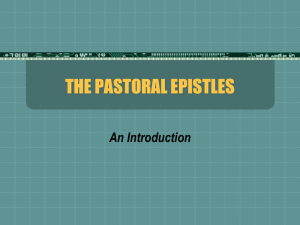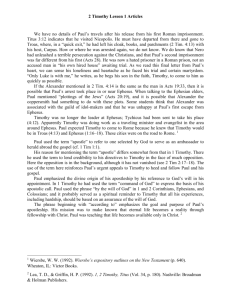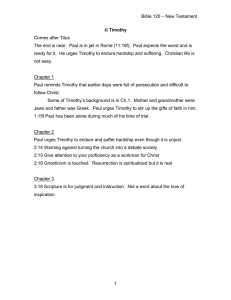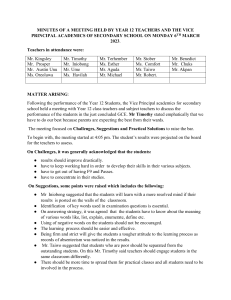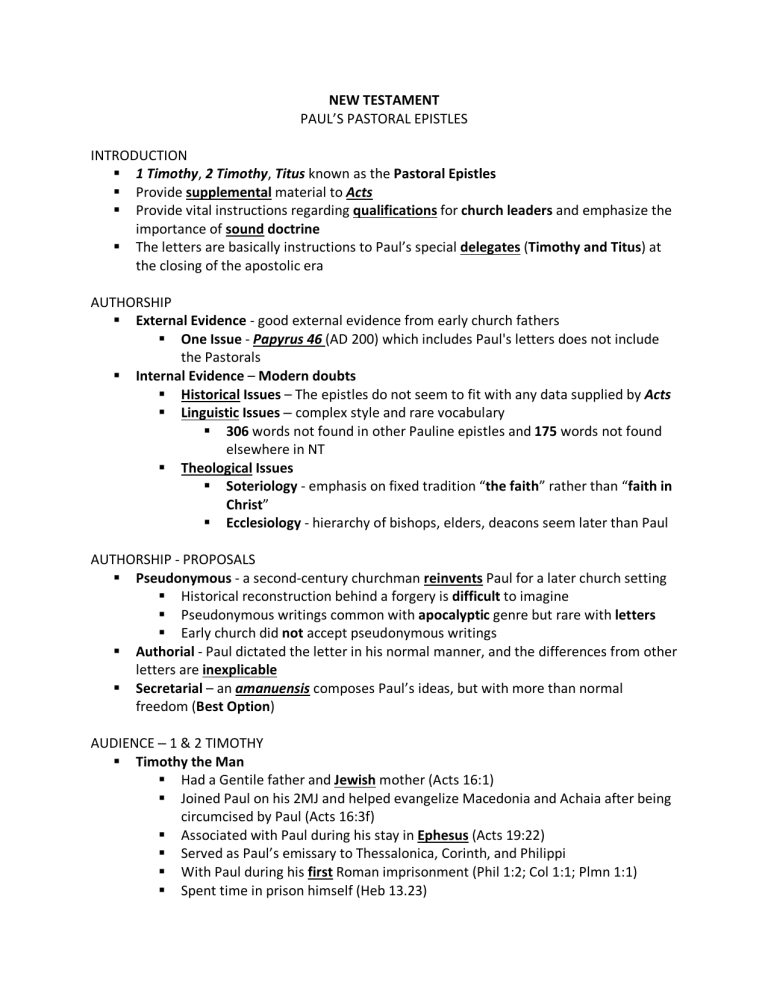
NEW TESTAMENT PAUL’S PASTORAL EPISTLES INTRODUCTION § 1 Timothy, 2 Timothy, Titus known as the Pastoral Epistles § Provide supplemental material to Acts § Provide vital instructions regarding qualifications for church leaders and emphasize the importance of sound doctrine § The letters are basically instructions to Paul’s special delegates (Timothy and Titus) at the closing of the apostolic era AUTHORSHIP § External Evidence - good external evidence from early church fathers § One Issue - Papyrus 46 (AD 200) which includes Paul's letters does not include the Pastorals § Internal Evidence – Modern doubts § Historical Issues – The epistles do not seem to fit with any data supplied by Acts § Linguistic Issues – complex style and rare vocabulary § 306 words not found in other Pauline epistles and 175 words not found elsewhere in NT § Theological Issues § Soteriology - emphasis on fixed tradition “the faith” rather than “faith in Christ” § Ecclesiology - hierarchy of bishops, elders, deacons seem later than Paul AUTHORSHIP - PROPOSALS § Pseudonymous - a second-century churchman reinvents Paul for a later church setting § Historical reconstruction behind a forgery is difficult to imagine § Pseudonymous writings common with apocalyptic genre but rare with letters § Early church did not accept pseudonymous writings § Authorial - Paul dictated the letter in his normal manner, and the differences from other letters are inexplicable § Secretarial – an amanuensis composes Paul’s ideas, but with more than normal freedom (Best Option) AUDIENCE – 1 & 2 TIMOTHY § Timothy the Man § Had a Gentile father and Jewish mother (Acts 16:1) § Joined Paul on his 2MJ and helped evangelize Macedonia and Achaia after being circumcised by Paul (Acts 16:3f) § Associated with Paul during his stay in Ephesus (Acts 19:22) § Served as Paul’s emissary to Thessalonica, Corinth, and Philippi § With Paul during his first Roman imprisonment (Phil 1:2; Col 1:1; Plmn 1:1) § Spent time in prison himself (Heb 13.23) § Timothy in Ephesus – “As I urge you when I went into Macedonia, remain in Ephesus” (1 Tim 1:3) § No indication in 2 Timothy for a different location for Timothy’s ministry AUDIENCE - TITUS § Titus the Man § Trusted associate of Paul who went with him to Jerusalem to discuss Paul’s gospel § He was a Gentile who was not compelled to be circumcised (Gal 2:3-5) § Not mentioned in Acts, but surfaces repeatedly in Paul’s letters as a member of the Pauline missionary team (2 Cor, Gal, 2 Tim) § Titus was to meet Paul in Nicopolis (Titus 3:12) and was there, in the region of Dalmatia, when Paul wrote 2 Timothy (2 Tim 4:10) § Titus in Crete § Left on the island of Crete by Paul to finish some unfinished business and appoint elders in every town DATE & PROVENANCE § Early Date – Assuming the letters fit into the Acts chronology § 1 Timothy written on Paul’s 3MJ - 1Tim 1:3 = Acts 20:1 (AD 55/56); Titus written on Paul’s way to Jerusalem (AD 57/58); 2 Timothy written from Caesarea (AD 5860) § Late Date – Assuming the letters were written after Acts (Best Option) § Eusebius - mentioned that Paul suffered two imprisonments in Rome § 1 Timothy – (AD 62-64) written after Paul’s release from 1st Roman imprisonment probably from Macedonia (1Tim 1.3) and possibly Laodicea (several manuscripts) § Titus – (AD 62-64) written after Paul's release from 1st Roman imprisonment possibly from Nicopolis in Macedonia (several manuscripts) or Corinth § 2 Timothy – (AD 64-68) written shortly before Paul’s death (2nd Roman imprisonment) as his last will and testament from Rome (several manuscripts) OCCASION & PURPOSE – 1 TIMOTHY & TITUS § Occasion - Paul released from Roman prison and takes Timothy back with him to Asia Minor after leaving Titus on Crete § Timothy encounters false teachers in Ephesus and Titus encounters them on Crete § The false teaching seems to have arisen from within the churches (1 Tim 1:3; 6:2; 2Tim 2:14; 4:2; Titus 1:13; 3:10) § Some scholars suggest that the heretics were elders in the church § Purpose - Paul writes 1 Timothy & Titus to address the issue of false teachers and to appoint godly leaders OCCASION & PURPOSE – 1 TIMOTHY & TITUS § Explicit Identity of False Teaching is Uncertain § Similarities to problems in Corinth and Colossae – denial of bodily resurrection (2 Tim 2:18/1Cor 15:12) and obedience to food laws (1Tim 4:3/Col 2:8, 16-23) § Gnostic? - The heresy involves an interest in myths and genealogies (1Tim 1:4; 4:7; 2Tim 4:4; Titus 1:14; 3:9); "avoid ... the opposing arguments of what is falsely called 'knowledge'" (1Tim 6:20) § Jewish? - concern with the law (1Tim 1:7; Titus 1:10, 14; 3:9) § Paul's Description -"fruitless discussion” (1Tim 1:6); "godless myths and old wives’ tales" (1Tim 4:7); "irreverent, empty speech" (1 Tim 6:20); "foolish and stupid arguments" (2 Tim 2:23); "foolish debates" (Titus 3:9) OUTLINE – 1 TIMOTHY § Introduction (1:1-2) § Salutations; Grace, Mercy, & Peace Wish § Paul's First Charge to Timothy (1:3-20) § Instruct others to avoid false doctrine (3-11) § Paul's personal example of faith and doxology (12-17) § Fight the good fight, keep the faith and a good conscience (18-20) § Paul's Second Charge to Timothy (2:1-3.16) § Pray for all because the gospel is for all (2:1-8) § Instructions for women (2:9-15) § Qualifications for church leaders (3:1-16) § Some will depart the faith and follow false doctrine (4.1-5) § Discipline yourself in godliness and teach others (4:6-16) OUTLINE – 1 TIMOTHY § Paul's Third Charge to Timothy (5:1-6:19) § Maintain respectful relationships within the church (5:1-6:2) § Pursue godliness rather than riches; and fight the good fight of the faith (6:3-16) § Closing (6:17-21) § Exhort the rich to be rich in good deeds § Guard the faith and avoid false doctrine § Grace Benediction OUTLINE - TITUS § Introduction (1:1-4) § Salutations; Grace & Peace Wish § Paul's First Charge to Titus (1:5-2:15) § Appoint qualified church leaders who will exhort sound doctrine (1.5-9) § Reprove false teachers so they may be sound in the faith (1:10-16) § Speak sound doctrine and maintain respectful relationships within the church (2:1-15) § Paul's Second Charge to Titus (3:1-11) § Remind the church to engage in good deeds toward all men (3:1-8) § § Avoid disputes with divisive people (3:9-11) Closing (3:12-15) § Travel plans and final exhortation to engage in good deeds § Greetings and Grace Benediction OCCASION & PURPOSE – 2 TIMOTHY § Occasion - Paul possibly spent some time in Philippi and Corinth (2 Tim 4.20) and wintered in Nicopolis on the southern Adriatic (Titus 3.12) § He attempted to return to Ephesus by way of Troas where he was re-arrested at the instigation of Alexander the metalworker (2 Tim 4.13-14) § Paul brought to Rome, had a preliminary hearing, and knows his end is near § Purpose - Paul wrote 2 Timothy as his "last will and testament" to encourage Timothy to continue the work of the ministry despite opposition OUTLINE - 2 TIMOTHY § Introduction (1:1-7) § Salutations; Grace, Mercy, & Peace Wish; Thanksgiving for Timothy's Faith § Paul's First Charge to Timothy (1:8-2:26) § Do not be ashamed to suffer for the gospel (1:8-10) § Follow Paul's example, retain sound doctrine, and guard the faith (1:9-14) § Be strong and endure suffering in the grace of Christ (2:1-13) § Avoid false doctrine and remind others to do the same (2:14-26) OUTLINE – 2 TIMOTHY § Paul's Second Charge to Timothy (3:1-4:8) § Godless men will love themselves rather than God (3:1-9) § Godly men will be persecuted and must continue in the teachings of Scripture (3:10-17) § Preach the gospel and fulfill your ministry (4:1-5) § Paul's sacrificial life as an example of a fulfilled ministry (4:6-8) § Closing (4:9-22) § Travel Instructions & final exhortation to be on guard § Greetings and Grace Benediction THEOLOGICAL EMPHASES § Qualifications of Church Leaders § For Paul, the character and integrity of church leaders was important since they are charged with doctrinal oversight § Some leaders had already compromised their faith and needed to be rebuked § Paul provided essential qualifications for anyone who sought to be an overseer or deacon in the church § Perseverance in the Faith and Sound Doctrine § § Paul encouraged Timothy and Titus to avoid false doctrine and to continue in the Faith and in teaching sound doctrine Some had already suffered shipwreck of their faith and in the future others will fall away from the faith because they will not continue in sound doctrine THEOLOGICAL EMPHASES § Good Deeds as Evidence of Godliness § The deeds of some church leaders showed themselves unfit for good deeds § Paul encouraged Titus to be a model of good deeds and to instruct others to apply themselves to good deeds § Paul encouraged those under Timothy's influence to be rich in good deeds § Trustworthy Sayings § Paul designated five statements in the Pastorals as "trustworthy sayings" which focus on the truth of the Gospel § Christ came to save sinners (1 Tim 1:15) § An overseer is a noble ministry (1 Tim 3:1) § Godliness is beneficial for the present and future life (1 Tim 4:8-9) § Endurance and Faithfulness will be rewarded (2 Tim 2:11-13) § God saved us according to His mercy and gave us His Spirit (Titus 3:4-8)
